Must Reads
There is so much to read, so much to know, so many sources to follow. And the volume of news and information just keeps growing exponentially. How to keep up? Even more, how to rediscover the serendipity of learning something new and interesting for its own sake?
Here, for your enjoyment and interest, are the articles Temin and Company considers “must reads.” They are primarily on the topics of reputation and crisis management, the media, leadership and strategy, perception and psychology, self-presentation, science, girls and women, organizational behavior and other articles of interest.
They are listed below with the most recent articles first, and to the side, by category.
We hope you enjoy them and would appreciate your comments. And whenever you have any favorite articles for us to add, please let us know so that we might include them for other readers to enjoy.
There is so much to read, so much to know, so many sources to follow. And the volume of news and information just keeps growing exponentially. How to keep up? Even more, how to rediscover the serendipity of learning something new and interesting for its own sake?
Here, for your enjoyment and interest, are the articles Temin and Company considers “must reads.” They are primarily on the topics of reputation and crisis management, the media, leadership and strategy, perception and psychology, self-presentation, science, girls and women, organizational behavior and other articles of interest.
They are listed below with the most recent articles first, and to the side, by category.
We hope you enjoy them and would appreciate your comments. And whenever you have any favorite articles for us to add, please let us know so that we might include them for other readers to enjoy.
Chaos Rules: 8 Ways To Navigate Through The Fog Of Crisis
Leadership, “Reputation Matters,” Forbes, April 3, 2020
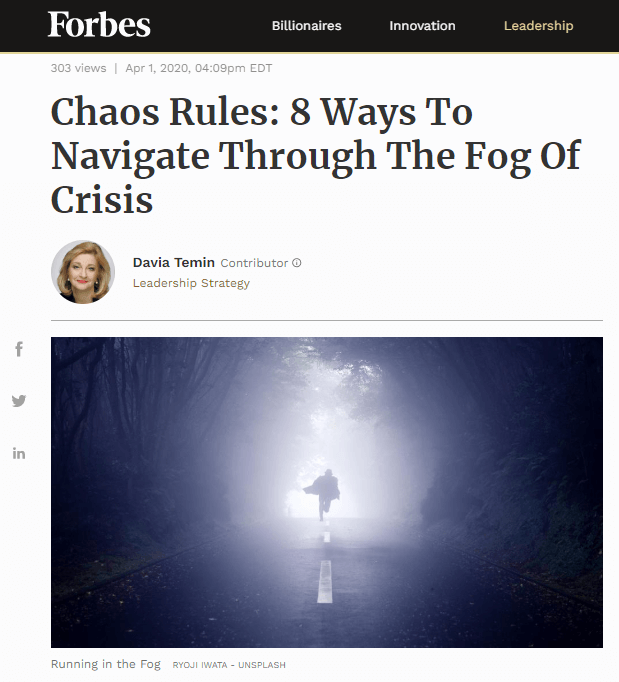
In wartime they call it the fog of war.
In crisis I call it the fog of crisis — but what it really amounts to is chaos.
So as we’re surrounded by a deteriorating civic infrastructure and national political response; as our lives and businesses are put on indefinite hold; as working indefinitely from home becomes untenable in many situations and organizations; as family pressures or the pain of isolation mount when we’re all sequestered at home; as joblessness careens; as the products we need the most – in hospitals and in our own lives – continue to be unavailable; and as more people get sick and die (this time, who we know) — the result is the fog of the coronavirus crisis.
It’s murky, dense and difficult to navigate. And it probably will exceed most of our abilities to cope at one time or another.
Chaos Rules
So, here are 8 ways that might help you get through it… [read more]
A Death at Jefferies Highlights Urgency of C-Suite Backup Plans
Jeff Green, Bloomberg Quint, March 29, 2020

Like all aspects of society, the rules of the C-suite are being rewritten under the pressure of a deadly pandemic. Professionals who help companies ensure leadership continuity say the coronavirus crisis has added a new urgency to their work. Some say clients are mulling whether to further isolate key executives; other clients have made private jets a given for top leaders who still travel; some have scattered top lieutenants across the globe as an added precaution. At least one is poised to hire a new chief executive officer largely by video interviews.
“Just as the virus cascades deeper into a population, so now too does your succession plan have to cascade into the population, into the hierarchy,” said Davia Temin, founder of New York crisis consultancy Temin & Co. And while bosses like JPMorgan Chase & Co.’s Jamie Dimon — a cancer survivor who just had emergency heart surgery — have a good plan in place, today’s coronavirus crisis means “you have to think of the succession to the succession.” […read more]
Chaos Leadership: When Does Global Crisis Turn Into Chaos And How Do We Survive It?
Leadership, “Reputation Matters,” Forbes, March 27, 2020
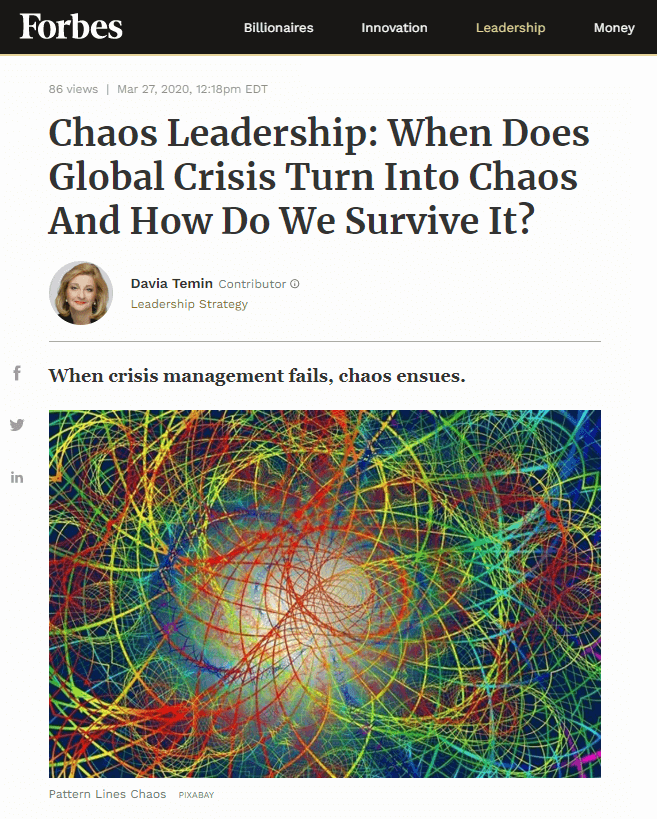
As we balance on the cusp between global crisis and total chaos — and we could make the jump into full-bore chaos at any moment — it is time to explore the difference between the two.
It also is time to talk about how the rules for handling chaos differ substantially from those that govern crisis response. Because if we cling to crisis management rules in order to address chaos, it will be as ineffective as if we treat coronavirus the same way we treat the common cold. […read more]
Managing Your Bank’s COVID-19 Communications in Social Media
Steve Cocheo, The Financial Brand, March 19, 2020
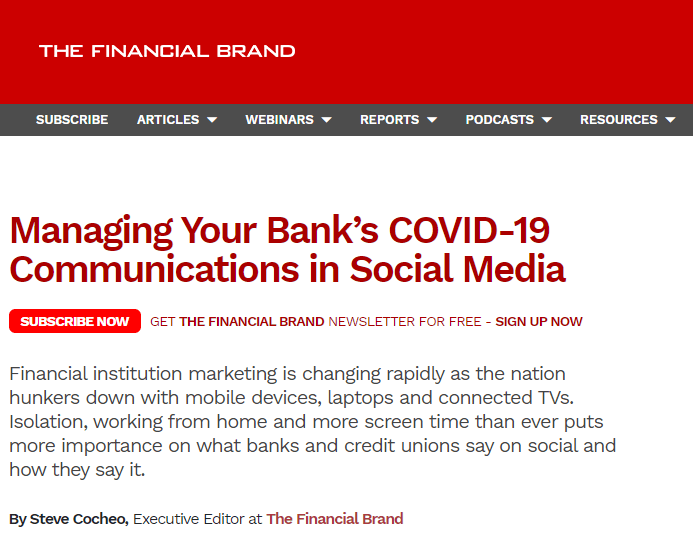
Financial institution marketing is changing rapidly as the nation hunkers down with mobile devices, laptops and connected TVs. Isolation, working from home and more screen time than ever puts more importance on what banks and credit unions say on social and how they say it.
Something that can be reassuring to both consumers and businesses is a demonstration that “we’ve got your back.”
“Banking institutions need to better communicate strength in uncertainty,” says Davia Temin, President and CEO of Temin and Company, a crisis management consultancy. “My suggestion is to channel Elizabeth Warren and ‘have a plan for that.’ Institutions might do well to showcase how much contingency planning they have done and how thorough it is. If the populace, the markets and the regulators believe them, life can be far less panic-driven.” […read more]
Expert Advice From Front-Line Physician On Leadership Needed To Combat COVID-19
Leadership, “Reputation Matters,” Forbes, March 18, 2020
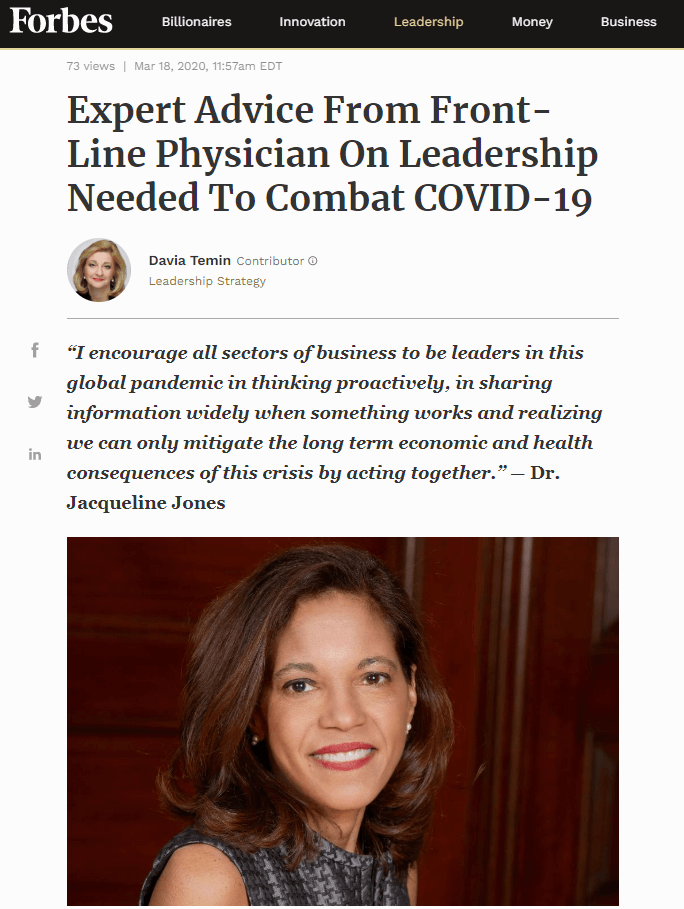
Earlier this week I wrote about Communicating in Crisis – Building Trust in an Untrustworthy World, and ended with the suggestion that true expertise and expert advice are critical to building trust. But it is almost impossible to sort out the expertise from all the misinformation floating about out there.
So, I asked my own trusted physician, Dr. Jacqueline Jones, one of the country’s leading ENT specialists, currently on the front-lines of fighting COVID-19 especially in children, for her expert advice. She shared it, both for patients, and for leaders in business, insurance, and medicine — and it is excellent. I would like to share it with you now. […read more]
Communicating In Crisis: How To Build Trust In An Untrustworthy World
Leadership, “Reputation Matters,” Forbes, March 4, 2020
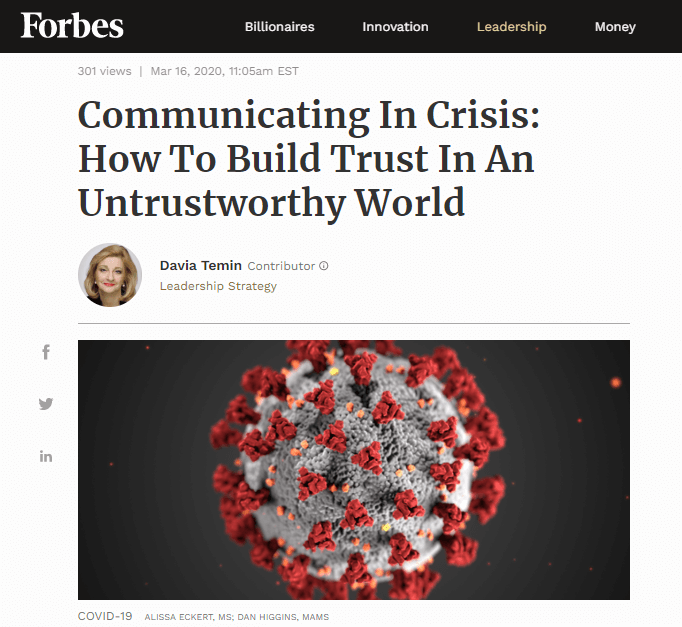
As we enter the first full week of the global pandemic and crashing financial markets, we are all looking for who to listen to, and who to believe.
We’re looking for a trusted voice in the storm to help guide us, one that can steer us toward the truth as it unfolds, and away from lies and misstatements, be they well-meaning or malicious. This is the leaders’s task — to provide that “True North” to employees, community, customers, investors, and stakeholders.
But this is an almost impossible task in such a topsy-turvy landscape, where it can be impossible to distinguish sky from ground.
Sequestered — quarantined by choice or fiat, or simply avoiding exposure by working from home — our choices for who to listen to have changed. No more can we comfortably sit across from our boss in a group meeting and use all of our senses to tell whether he or she is telling us the whole truth. Working remotely, half of the sensors we are used to using are missing.
And while we’re incredibly lucky to have video and teleconferences, podcasts and webinars, live streaming, virtual chat rooms, and virtual galas, salons, board meetings and policy meetings — still that personal touch is missing, and with it many of the clues we use to determine integrity and truthfulness.
So who do we trust? And how can leaders establish trust? […read more]
Is your board risk-ready?
Michele Wucker, Strategy + Business, March 11, 2020
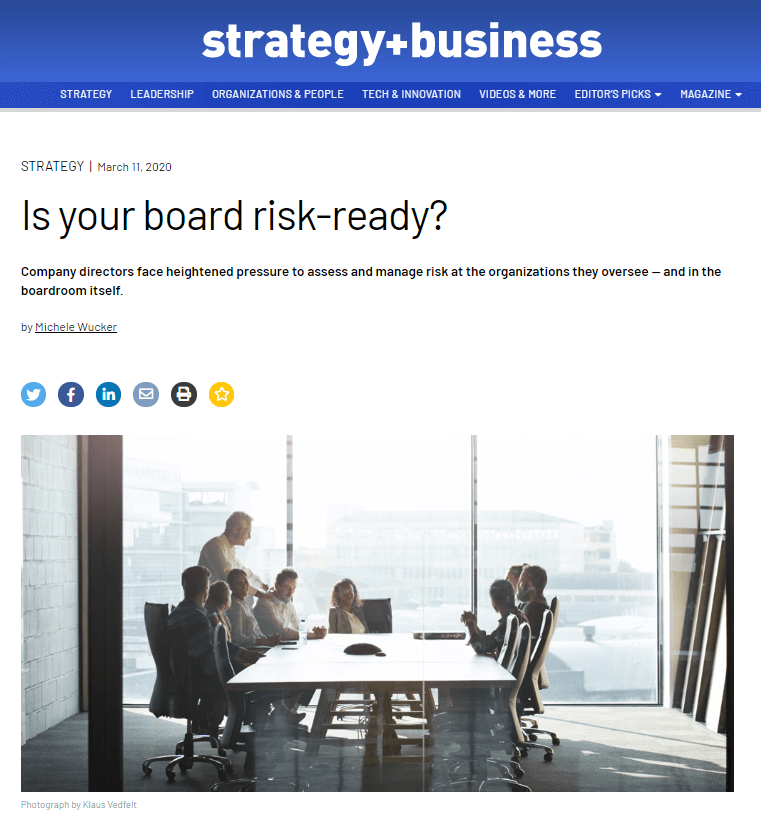
Your company’s board of directors is charged with reviewing all kinds of risks to the corporation. But how well prepared are its members to do so? How ready are directors to evaluate, communicate, and act on risks — and thus to better ensure that their companies are doing a good job? A great deal rides on the answers to these questions.
Understanding the risk attitudes of directors as individuals and as a whole can make all the difference if a risk materializes into a full-blown crisis. Davia Temin, founder of the New York–based crisis management firm Temin and Company, said it’s essential to understand and improve a board’s risk reaction dynamics during times of calm. “It’s better to fix the fissures on a board ahead of time because every fissure will explode in a crisis,” she said.
She recommends boards do an annual risk survey to determine how attuned different directors are to various risks. Crisis scenario games can shed light on differences among board members in their responses to stress and risks, and help board chairs to identify ahead of time which directors they might lean on most when — not if — a crisis hits. In fact, PwC’s 2019 survey found that the percentage of directors participating in crisis management tabletop exercises doubled since last year, from 28 percent to 56 percent. […read more]
Wells Fargo’s Duke Quits Before Turn in Washington Hot Seat
Hannah Levitt, Bloomberg, March 9, 2020 »
Wells Fargo & Co. Chair Betsy Duke resigned from the company’s board ahead of a dramatic congressional hearing set for this week, succumbing to the same political pressures that have claimed multiple former leaders of the bank.
The lender said Monday that board member Charles Noski will replace Duke as chair. Duke faced a growing chorus of calls for her departure after Democrats atop the House Financial Services Committee issued a scathing report last week on the bank’s response to a series of consumer scandals.
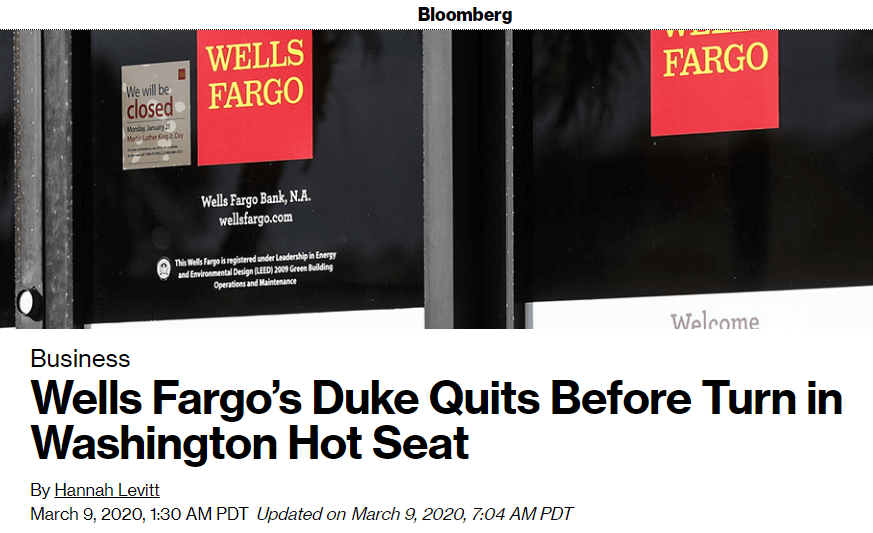 The latest set of hearings begins Tuesday with an appearance by CEO Charlie Scharf, less than five months into his tenure. The committee will seek his thoughts on next steps for what it calls “the bank that broke America’s trust.”
The latest set of hearings begins Tuesday with an appearance by CEO Charlie Scharf, less than five months into his tenure. The committee will seek his thoughts on next steps for what it calls “the bank that broke America’s trust.”
Scharf is preparing to answer questions on what he’s doing to get back in the good graces of customers, regulators and the public. He’s met with nearly half the House Financial Services Committee, including Waters, since taking over in October, people with knowledge of the meetings said.
He’ll be able to point to changes he’s made since taking the helm, including adding new leaders and settling past probes. And he can tout the bank’s recent announcements on minimum-wage increases, limited-fee bank accounts and lending to recipients of the Deferred Action for Childhood Arrivals program.
Scharf “can come on as a hard-nosed leader who is going to do the bidding of the public and fix things,” Davia Temin, founder of crisis consultancy Temin & Co., said in an interview. “America still loves a comeback kid.”
The board members faced a different task, Temin said. “It’s harder to be part of the problem and then the solution.” […read more]
Crisis Leadership In Real Time: 8 Best Practices For Public Healthcare Emergencies
Leadership, “Reputation Matters,” Forbes, March 4, 2020
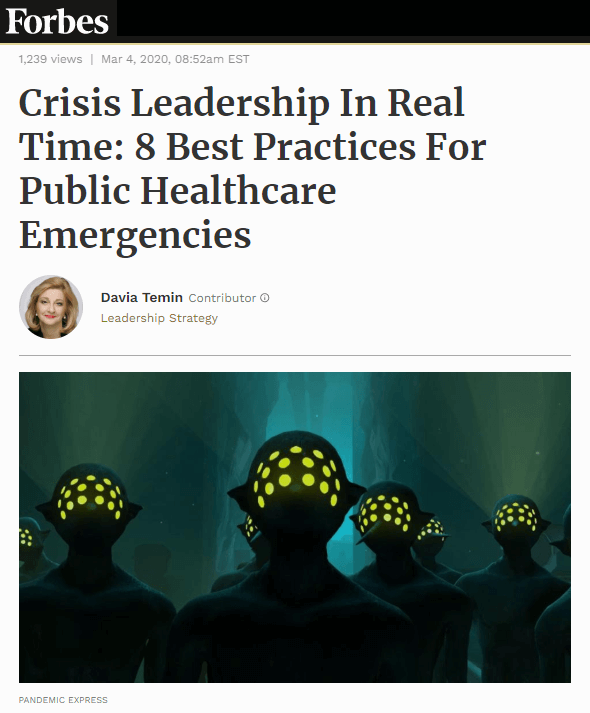
So, it’s here. We now have a public healthcare crisis in front of us that is already disrupting global markets, businesses, and lives, and has the potential to do much more damage. Or not, depending upon who you are, and what and who you believe.
Just as with the climate crisis, while the facts are the facts, how we respond to the COVID-19 crisis says more about who we are, and how we lead, than it does about the crisis itself.
So, it’s probably a good time to begin recasting more generic crisis management rules into a specific set of rules for our current challenge. Whether the current Coronavirus crisis is ever dubbed a pandemic or not, we surely need to develop some advanced thinking on how to deal with it.
Following is a new set of 8 pandemic ‘best practices,’ for your consideration. […read more]
Victoria’s Secret Faces New Sexual Misconduct Allegations
Jordyn Holman and Kim Bhasin, Bloomberg, February 3, 2020
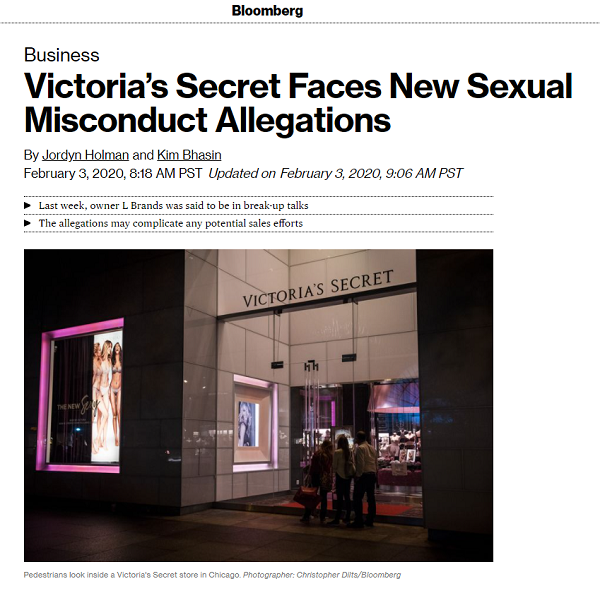
New allegations of sexual misconduct have surfaced at Victoria’s Secret as the brand tries to remake its image after years of scandal and slumping sales.
Female models and executives were bullied and harassed for decades at the lingerie chain, evidence of an “entrenched culture of misogyny,” according to a New York Times investigation published this weekend.
The revelations come days after reports that L Brands Inc., owner of the troubled retailer as well as Bath & Body Works, was in talks to break up the company and that longtime Chief Executive Officer Les Wexner could step down.
***
Davia Temin, CEO of crisis consulting firm Temin and Company, said the problems at Victoria’s Secret have become endemic, and it may need a new owner to survive. Patching up the brand by tweaking advertising won’t be enough, she said.
“Unfortunately, now Victoria’s Secret’s brand has gone to sleazy from sexy,” Temin said. “And no re-brand is going to fix that.” […read more]



